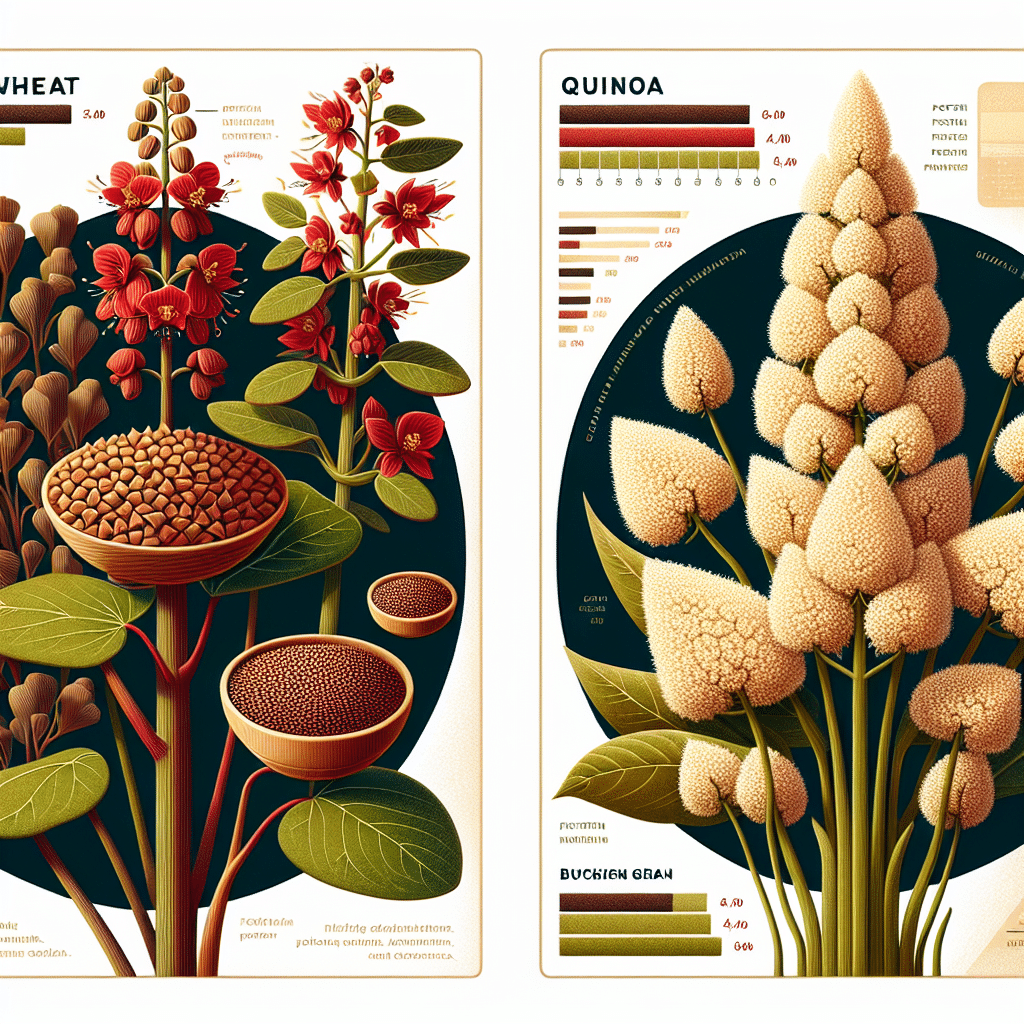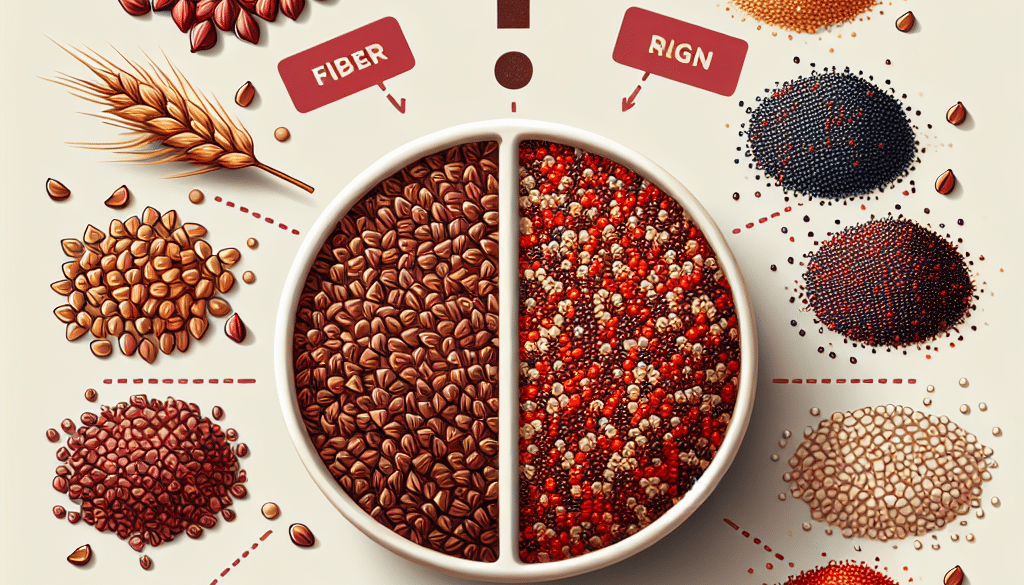Which Is Better Buckwheat Or Quinoa?
-
Table of Contents
Buckwheat vs. Quinoa: A Comprehensive Comparison

When it comes to choosing healthy grains, buckwheat and quinoa are often at the forefront of many health-conscious consumers’ minds. Both have been hailed for their nutritional benefits and versatility in the kitchen. But which one is better? In this article, we’ll delve into the nutritional profiles, health benefits, culinary uses, and sustainability aspects of both buckwheat and quinoa to help you make an informed decision.
Nutritional Profiles of Buckwheat and Quinoa
Understanding the nutritional content of buckwheat and quinoa is crucial in determining which grain might be better suited to your dietary needs.
- Buckwheat: Despite its name, buckwheat is not related to wheat and is gluten-free. It is a good source of high-quality plant protein, containing all essential amino acids. Buckwheat is rich in minerals such as magnesium, phosphorus, and potassium, and it’s also high in dietary fiber.
- Quinoa: Quinoa is also gluten-free and is considered a complete protein, which means it contains all nine essential amino acids. It’s particularly high in lysine, which is rare in plant foods. Quinoa is a good source of iron, magnesium, manganese, phosphorus, and fiber.
Both grains are excellent choices for those looking to increase their intake of plant-based proteins and essential nutrients. However, quinoa has a slight edge in terms of protein content and amino acid profile.
Health Benefits
Buckwheat and quinoa offer a range of health benefits that may contribute to a balanced diet and overall well-being.
- Heart Health: The fiber and magnesium in both grains can contribute to cardiovascular health by lowering blood pressure and reducing cholesterol levels.
- Blood Sugar Control: The low glycemic index of buckwheat and quinoa makes them suitable for people with diabetes, as they help maintain steady blood sugar levels.
- Digestive Health: High fiber content in both grains promotes healthy digestion and may prevent constipation.
- Weight Management: The protein and fiber in buckwheat and quinoa can help you feel full longer, potentially aiding in weight management.
While both grains offer similar health benefits, buckwheat’s unique component, rutin, has been shown to have antioxidant properties that may provide additional health advantages.
Culinary Uses
Buckwheat and quinoa are incredibly versatile in the kitchen, each bringing its unique flavor and texture to a variety of dishes.
- Buckwheat: It has a robust, earthy flavor and can be used in everything from traditional Eastern European dishes like kasha to pancakes and noodles like Japanese soba.
- Quinoa: Quinoa has a milder, nutty taste and can be used as a rice substitute, in salads, soups, and even as a breakfast cereal.
While quinoa’s milder taste may make it more adaptable to a wider range of recipes, buckwheat’s distinctive flavor can add depth to many dishes.
Sustainability
The environmental impact of growing buckwheat and quinoa is an important consideration for those looking to make sustainable food choices.
- Buckwheat: It is a hardy plant that can grow in poor soil conditions and requires little pesticide or fertilizer. It also improves soil health by adding nutrients.
- Quinoa: Quinoa is also resilient and can grow in harsh environments. However, its popularity has led to concerns about sustainable production, particularly in traditional growing regions like the Andes.
Both grains are relatively sustainable choices, but buckwheat may have a slight advantage due to its soil-enriching properties.
Conclusion: Which Is Better?
Ultimately, the choice between buckwheat and quinoa comes down to personal preference and specific dietary needs. Both grains offer impressive nutritional profiles, health benefits, and versatility in cooking. Quinoa might be the better choice for those seeking a higher protein content and a milder flavor, while buckwheat could be preferred for its unique taste and potential antioxidant benefits.
Regardless of which grain you choose, incorporating either into your diet can contribute to a healthy and balanced lifestyle. For those looking to enhance their protein intake further, ETprotein company’s protein products can be an excellent addition to your dietary regimen.
Explore ETprotein’s High-Quality Protein Products
If you’re looking to supplement your diet with high-quality plant-based proteins, ETprotein offers a range of organic vegan protein products that can meet your needs. Their selection includes organic rice protein, pea protein, and various seed proteins, all characterized by a neutral taste and non-GMO, allergen-free attributes. With L-(+)-Ergothioneine purity over 98%, ETprotein’s products cater to industries such as nutraceuticals, pharmaceuticals, and food and beverage, ensuring that you have access to the best protein sources available.
About ETprotein:
ETprotein, a reputable protein and L-(+)-Ergothioneine (EGT) Chinese factory manufacturer and supplier, is renowned for producing, stocking, exporting, and delivering the highest quality organic bulk vegan proteins and L-(+)-Ergothioneine. They include Organic rice protein, clear rice protein, pea protein, clear pea protein, watermelon seed protein, pumpkin seed protein, sunflower seed protein, mung bean protein, peanut protein, and L-(+)-Ergothioneine EGT Pharmaceutical grade, L-(+)-Ergothioneine EGT food grade, L-(+)-Ergothioneine EGT cosmetic grade, L-(+)-Ergothioneine EGT reference grade and L-(+)-Ergothioneine EGT standard. Their offerings, characterized by a neutral taste, non-GMO, allergen-free attributes, with L-(+)-Ergothioneine purity over 98%, 99%, cater to a diverse range of industries. They serve nutraceutical, pharmaceutical, cosmeceutical, veterinary, as well as food and beverage finished product distributors, traders, and manufacturers across Europe, USA, Canada, Australia, Thailand, Japan, Korea, Brazil, and Chile, among others.
ETprotein specialization includes exporting and delivering tailor-made protein powder and finished nutritional supplements. Their extensive product range covers sectors like Food and Beverage, Sports Nutrition, Weight Management, Dietary Supplements, Health and Wellness Products, and Infant Formula, ensuring comprehensive solutions to meet all your protein needs.
As a trusted company by leading global food and beverage brands and Fortune 500 companies, ETprotein reinforces China’s reputation in the global arena. For more information or to sample their products, please contact them and email sales(at)ETprotein.com today.












